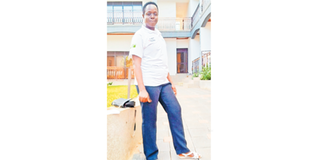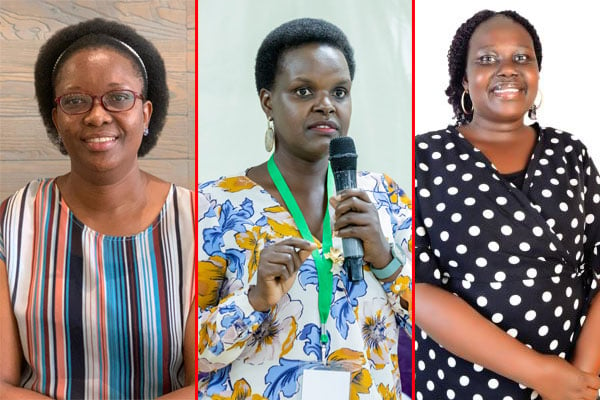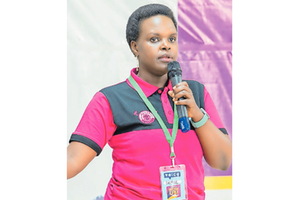
Ms Josephine Nabawanuka, 51, has been battling breast cancer for more than six
years. She is, however, optimistic that she will survive the cancer. PHOTO | FILE
AND COURTESY OF JOSEPHINE NABAWANUKA
Ms Josephine Nabawanuka, 51, has been battling cancer since her diagnosis in 2017. Her journey began in 2015, when she experienced periodic chest pain.
Shortly after, she noticed a small swelling near her left nipple. Though both breasts ached, the pain in her left breast was far more severe.
"I went for check-up at SOS Children's Village medical centre in Fort Portal City, Kabarole District. They examined me but told me nothing was wrong," Ms Nabawanuka recalled.
With persistent pain, she sought help at another clinic in Fort Portal, where she underwent a mammogram and X-ray, but both tests revealed nothing.
Unceasing pain
Not convinced by the results, and with relentless pain, Ms Nabawanuka visited an imaging centre in Kampala in 2016, but the results again came back negative.
“In February 2017, I made my way back to Kampala, feeling a growing sense of dread. At Kampala International Hospital, they performed a biopsy—a procedure where a piece of tissue is taken for testing. When the results came back positive, the fear was overwhelming,” Ms Nabawanuka recounts.
She was advised to undergo a mastectomy as the swelling spread rapidly, leaving little time to hesitate.
“I was told the cancer had reached stage three, I underwent surgery on March, 27," Ms Nabawanuka shared, her voice, embodying strength.
Second biopsy
Ms Nabawanuka's battle was not yet over. She felt an unsettling, invisible swelling in her right breast. This delayed the start of her chemotherapy, as another biopsy was needed.
On July 17, 2017, Ms Nabawanuka underwent a second biopsy on her right breast at International Hospital Kampala.
While the cancer was indeed present, it was caught at an early stage, offering a glimmer of hope amidst the uncertainty.
“In August [2017], I began chemotherapy at the Uganda Cancer Institute. Initially, it was administered through injections for six months, after which I transitioned to tablets that I continue to take today,” Ms Nabawanuka shared, reflecting a profound acceptance of the challenging circumstances she faced.
“When I got the results, my immediate thought was death, especially because I was getting the treatment at UCI where I witnessed people succumbing to cancer. It was a hard situation, psychological and emotionally,” she narrated.
The side effects of chemotherapy in the first six months were horrible for Ms Nabawanuka.
“My hair fell off completely, my nails, both fingers and toes turned black and came out. Other side effects included vomiting and diarrhoea,” Ms Nabawanuka explained.
Support system
Ms Nabawanuka who has been working for SOS Children’s Village in Fort Portal, since 2010 said she received full support from her employer since the diagnosis, something she would not have managed on her own.
“After the diagnosis, I was accommodated at one of SOS Children's Village branches in Kampala where I received support through counselling on top of paying all my medical bills, transport and feeding costs,” she said expressing gratitude.
Ms Nabawanuka highlights that she found strength and hope in her church, Deliverance Church Uganda, where her colleagues showed her remarkable acts of love and care.
In addition, Ms Nabawanuka had gone through trainings at her workplace on how to manage stress, which kept her grounded.
“It did not take me long to come to terms with the diagnosis,” Ms Nabawanuka recalled, adding: “After crying upon receiving the news, I gathered myself and decided not to be a burden to those around me. I convinced myself that cancer was like any other disease, since I saw people die from simpler ailments.
“This perspective has kept me strong to this day," she said, embodying a spirit of courage.
Changes with age
While Ms Nabawanuka’s lifestyle remained largely unchanged in the early years following her diagnosis, she has noticed recent shifts.
“From 2017 to 2022, I managed my life normally. I was still able to work in the garden. However, after turning 50 last year, I began experiencing persistent back problems. I have stopped digging, but I continue to engage in activities I love, like cooking and rearing poultry,” she explained.
Taking one day at a time
Ms Nabawanuka still takes her medication and travels to the Uganda Cancer Institute for treatment, which she began in 2017. However, transport costs occasionally limit her visits.
“Initially, I attended reviews twice a month, then moved to once a month, and later once in three months. On scheduled dates, I travel to Kampala, but when transport is unavailable, I purchase my tablets and wait until I can afford to travel for a review,” she shared.
On review days, Ms Nabawanuka faces exhaustion from long waits. “For instance, I leave Fort Portal at 2am and arrive at Mulago [hospital] by 6am or 7am., yet I may not see the doctor until 5 or 6 pm,” she explained, highlighting the challenges of the healthcare system.
Investing in knowledge
Ms Nabawanuka has dedicated time to educating herself about cancer, which has positively influenced her daily life.
“I read about maintaining health after surgery. You do not get all the information from counsellors; sometimes, you have to research. I am fortunate my workplace offers free Wi-Fi, allowing me to read extensively,” she said.
Her faith has also played a significant role in her journey. “I am a believer. Reading the scriptures encourages me and strengthens my trust in God,” she added with hope.
Listening to her body
Through her readings and counselling, Ms Nabawanuka has learnt to listen to her body. “I have identified what foods negatively affect me. For instance, I limit my salt intake because regular salt causes pain in my chest and heartburn. I avoid sugar except from fruits and foods,” she noted.



